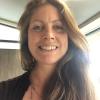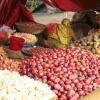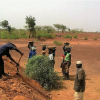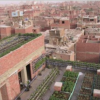Making climate change real for vulnerable populations
The poor in Pakistan who live in informal settlements are the first to be hit by climate change. It affects their drinking water and floods their houses. But they cannot make the link between the three, says Mary James Gill, a human rights lawyer and activist based in Lahore, Pakistan, because relevant information is bookish and cannot be readily communicated.
About 60 percent people living in informal settlements or slums in Lahore do not have access to clean drinking water. Only about 7 percent get safe drinking water. The rest contend with water contaminated with sewage, and shortages exacerbated by climate change-induced droughts and floods. These people are also the least able to influence local government agencies in Pakistan to improve water supply and quality.
They have not made the connection between climate change and water supply, nor the periodic floods that inundate their houses. This is partly because earning a living from daily wage jobs occupies most of their time and attention. And partly because local governments and civil society organizations have not been able to communicate these issues to them in a way they will understand.
Those worst-affected perceive climate change as a distant threat.
”Climate change is seen as an elitist issue but impacts everybody, especially the vulnerable. People in informal settlements do not have basic amenities. Many of them are sanitation workers. They face discrimination based on caste, work and have no access to safe drinking water and sanitation. They can be evicted anytime.”
Making ing climate change relevant and tangible to people. For example, the quality of drinking water may be compromised as it could be contaminated by sewage. People need to understand the need to treat water for drinking. But those who do not have safe drinking water, toilets and sewage and have to live from day to day, cannot comprehend the relevance and immediacy of climate change. The language is very important to make people understand it is a human rights issue. The dialect and words are critical.
For example, people have become conscious of the need to plant trees. People need to be able to take advantage of basic amenities, understand social distancing, get basic health care. Slum dwellers need to be the focus of climate justice and adaptation. If the environment is better, they benefit. The language used needs to explain how small interventions can improve their lives. They need to be convinced and take ownership. If they understand how it will effect their future, they may engage more actively.
Intead, the government has talked about tree plantation and how it is the only way to overcome climate change. But people living in the informal settlements do not care at all what these plants would do to them because they are fighting for daily livelihoods, and basic facilities like food and water.
”I am of the view that the language being used and how it is being conveyed will make all the difference. People need to understand how climate change is affecting them directly. We are trying to see if people can be more receptive but so far we have not been able to convince them (of the links). While clean drinking water is a basic right climate change, is still a far-fetched idea.”
This the right time to make people realize that climate change is affecting their lives. Pakistan and much of the rest of the world is facing floods. The lives and health of those living in informal settlements are affected. But the narrative must change, it must be presented in their own colloquial language. All the information on climate change is bookish and in English. What we need is visual material that talks to people in their own language. The civil society organizations and others can use this information to convey the impact of climate change to those it affects the most.
The information on climate change is bookish and in English. What we need is visual material that talks to people in their own language. The civil society organizations and others can use this information to convey the impact of climate change to those it affects the most.
These are excerpts from an interview with Mary James Gill, a human rights lawyer, an activist and a political leader. She is the founder of Sweepers Are Superheroes, a first-of-its-kind campaign aiming to raise awareness of sanitation workers’ plight and advocate for their right to dignity, safety, and social protection. She has been awarded the French Government’s Human Rights Prize 2021 and Sweden's prestigious Anna Lindh Prize 2020. You can read more of her writing here.
campaign aiming to raise awareness of sanitation workers’ plight and advocate for their right to dignity, safety, and social protection. She has been awarded the French Government’s Human Rights Prize 2021 and Sweden's prestigious Anna Lindh Prize 2020. You can read more of her writing here.











Trending Discussions
From around the site...
“Absolutely interested! I'll connect via email to discuss reviewing and enhancing the Economic Analysis of Climate...”
Adaptation-related events at COP28 (all available to follow/stream online)
“Please check out these adaptation-related events taking place at COP28 - all available online (some in person too if...”
Shining a light for biodiversity – four perspectives to the life that sustains us. Four hybrid sessions.
“30 November to 19 December 2023 - Four Sessions Introduction The SDC Cluster Green is happy to invite you to the...”